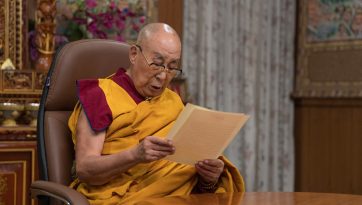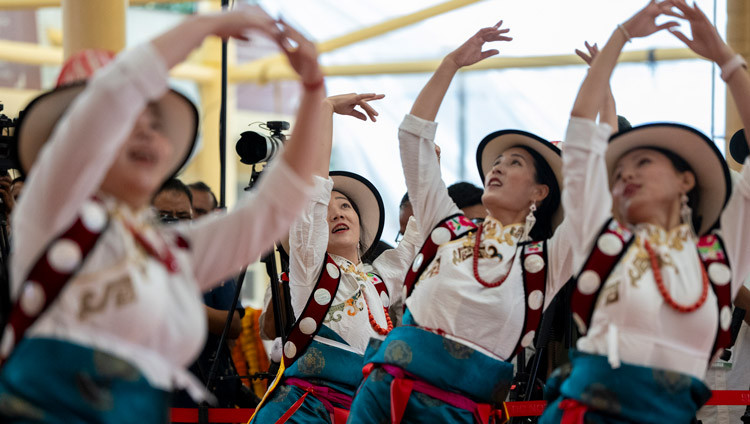His Holiness the Dalai Lama Attends the Tibetan Homes Foundation Golden Jubilee and Speaks at Wynberg Allen School
Mussoorie, India, 17 September 2012 – His Holiness the Dalai Lama was the Chief Guest at the Tibetan Homes Foundation (THF) Golden Jubilee celebrations in Happy Valley, Mussoorie today. Heavy rain from early in the morning had left the ground wet, which did nothing to prevent the stirring display as teams of students from the various houses of the Tibetan Homes Foundation, Happy Valley, local satellite schools like Rajpur and Rishikesh and others from the Central School for Tibetans (CST) in Happy Valley marched past to the beat of drums. Once all had filed onto the ground, spectators stood to join them in singing first the Indian and then the Tibetan National Anthems.
The General Secretary (THF) welcomed His Holiness and read his report, followed by that of the Principal (CST). Students then performed songs and dances typical of the three provinces of Tibet. His Holiness released the Golden Jubilee souvenir book, telling the audience that the photograph of himself with Pandit Nehru on the cover was taken nearby, outside Birla House, where he was staying in April 1959.
Mr Helmut Kutin, former President of SOS Kinderdorf, long time supporters of the Tibetan Homes Foundation, OP Unyal, Chairman of the Mussoorie City Board and Ganesh Joshi, local MLA, all spoke before His Holiness was invited to address the students, staff and friends of the school. He began, “Today, when we are celebrating the 50th anniversary, everything has gone very well and I’d like to thank all of you have contributed to this occasion. The Homes Foundation has asked us all not to lose hope, but to keep our homeland in mind, which is very good advice.
“Our Indian friends have spoken warmly about the longstanding good relations between India and Tibet, a connection that is neither economic nor military, but a relation that exits between Guru and Chela. As one of our scholars remarked the Land of Snow may have been white in colour, but until the light of wisdom came from India, it was dark in Tibet. In the 7th and 8th centuries great Indian masters like Shantarakshita, his disciple Kamalashila , who were great philosophers and logicians, and Padmasambhava came and taught in Tibet.
“These days, it seems a lot of people seem to think Buddhism is only about prayer, when it is actually about study and maturing the mind. In order to practise you have to take account of reality, both of the external world and especially the inner world. And today, while we learn from science, scientists are learning about the mind from us.
“On an individual level we can derive benefit from Tibetan Buddhist culture by learning to control our emotions. When we face trouble we can tackle it with peace of mind. This is what makes our heritage so valuable and what we can be proud about.”
His Holiness said that since he has devolved his political responsibilities to an elected leadership he doesn’t have much to say about the political situation in Tibet. However, as he remarked at Woodstock School yesterday, if we look at the situation in Tibet on its own it looks grim, but if we take a broader perspective there’s still room for hope.
“The trouble in Tibet is that uninvited guests arrived armed with guns and other weapons and set themselves up there. Despite Tibet having its own system of administration and economic management, they dismissed everything we did as backward, to the extent that they would almost try to teach us how to eat tsampa. They do not take a broad view, seeking really only to control Tibet. On the other hand, when they understand the situation, many Chinese intellectuals support our position, while the increasing numbers of Chinese Buddhists are taking a sympathetic interest in Tibetan Buddhism. In Tibet spirits are high and we in exile are free. Tashi delek.”
After lunch, His Holiness viewed a photo exhibition covering the 50 years of the Tibetan Homes Foundation and met with sponsors and friends from abroad, who he thanked on behalf of the Tibetan people for their support for this project to preserve Tibet’s identity and culture by educating its children.
His Holiness was welcomed to Wynberg Allen School by the Principal who introduced him to the audience of students and staff, thanking him for taking time to come despite the school having been late to invite him. His Holiness responded, “Brothers and sisters, young brothers and sisters, you mentioned your invitation being late, but it wasn’t a problem because I am always keen to meet young people.
“Time is always moving on and no force can stop it. My own generation, people over 60 or 70 belong to the twentieth century, which is now over and gone. People like these who are less than 20 years old truly belong to the twenty-first century. They will shape the future.
“The twentieth century was an era of unparalleled bloodshed, during which some say 200 million died through violence. If we are to make this century more peaceful, we won’t do it by prayer alone, we have to take action. The reality is that the future of our world is in our human hands. Whether it turns out to be a happy or miserable time depends on this twenty-first century generation. I hope your efforts will produce a good result, but my generation won’t be there to see it. However, this is why I’m always happy to meet young people.”
His Holiness mentioned several factors that are a cause for worry: the huge and growing gap between rich and poor, the continuing prevalence of corruption and violence on a domestic as well as national and international level. He said, “Something’s wrong.” He went on to suggest that we are not trouble-makers when we are born, and that we are naturally gentle. It seems that those who receive love and affection when they are young tend to grow up to be calm and attentive to the needs of others, His Holiness thought they probably study better and enjoy better health too . However, those who have little concern for others tend to be fraught with suspicion, mistrust and ultimately loneliness. This is contrary to human nature because we are social animals.
“In order to lead a meaningful life, you need to cherish others, pay attention to human values and try to cultivate inner peace.”
One of the students asked what we can do to contribute to world peace and His Holiness responded that sometimes the task seems so big that no one can tackle it. And yet as violence is a man-made problem, it should be possible for people to put a stop to it. Not all of the 7 billion human beings alive today are suddenly going to work for peace, but a beginning can be made on an individual level. As an example of how individuals can make a difference he mentioned the Buddha who began by teaching only five people; they passed his message on and it grew.
Another student asked how to achieve peace of mind. His Holiness advised, “I am a Buddhist who is critical of the present state of Buddhist practice, which is often too involved with ceremony and ritual. The proper practice is to use our human intelligence to transform our emotions. I am a human being, I also experience destructive emotions, but the only difference is that I use my intelligence to discriminate which of my emotions is helpful and which is harmful. I then try to restrain the harmful and increase those that are helpful and this gives me peace of mind.
A final student asked what inner peace means and His Holiness jokingly replied,
“Inner peace is inner peace! To have peace of mind is to be not only physically relaxed, but completely relaxed on a mental level too; not dull, but fully alert. When something negative occurs, if you focus on that alone, it seems to be entirely negative, but if you are sufficiently at ease to be able to look at it from a broader perspective, you may be able to see some positive side to it and this brings inner strength, reduces fear and anxiety. When you have inner peace, your mind remains unruffled whatever happens. The important thing is to deal with the trouble makers within our own minds.”
Tomorrow His Holiness will give a brief explanation of the verse for taking refuge and generating the awakening mind of Bodhichitta to the Tibetan Homes Foundation students before returning to Dharamsala.




